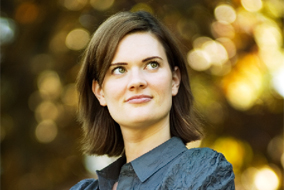
Catherine Corrigall-Brown has returned home to teach undergraduate students - photo by Martin Dee UBC Reports | Vol. 53 | No. 10 | Oct. 4, 2007
Arts Initiative Targets Undergrad Teaching
Attracts 14 Highly Regarded Post-docs
By Julie-Ann Backhouse
This year, UBC arts students have a chance to learn from young intellectuals and gain exposure to leading interdisciplinary research with the appointment of 14 new post-doctoral teaching fellows in the arts faculty.
The initiative, the first of its kind in Canada, has brought together 14 young, highly regarded post-doctoral fellows fresh from studies across the world in places like Barcelona, Chicago, Connecticut, Manchester, London and Sydney.
Catherine Corrigall-Brown is one of them and has returned home to Canada with a PhD from the University of California, Irving. Her research and work on social movements and activism won an outstanding teaching award in the US.
“How can individuals change the world?” asks Corrigall-Brown as she outlines her recent research. “What role do social movements play and why do people stay active in them over time?” All inspiring questions that relate to undergraduate experience and connect to the west coast as the home of peaceful protests and the birthplace of Greenpeace.
Of the inaugural 14 new appointments, Corrigall-Brown is one of nine teaching first-year classes, addressing an area of high enrolment. She is teaching in collaboration with Prof. Neil Guppy, head of the Department of Sociology. “Having a mentor gives you both constructive feedback and a positive role model,” she notes.
The new post-doctoral fellows will be teaching undergraduate classes on subjects that range from the microscopic to the monumental: from the effects of emotional states on social behavior to why people join social movements; from glacial geomorphology to the history of science; from sustainable societies to how civil conflict can transform economies of war into economies of peace.
“There are many ways to learn and I love to teach in the outdoors where it is a complete experience, where students have direct, physical access to the concepts they are learning about the environment and can get their hands dirty,” says Michele Koppes who will be running part of the Physicial Geography Field Course for geography students.
Koppes studied the impact of climate and ice dynamics on glacial erosion rates at the University of Washington, worked as a science advisor in Washington DC and also developed an experientially-based course on glacial geomorphology for women aged 14-19 called the Girls on Ice program.
Last year UBC President, Stephen Toope made a commitment to improve undergraduate teaching and learning. His idea -- to match existing UBC scholars with new post-doctoral teachers in undergraduate classrooms -- was backed by an allocation of $3million.
With two-year appointments, these 14 post-doctoral fellows are the first of 30 recruits over the next three years. Already over 40 new courses have been created within the UBC Arts Faculty and could expand to include other faculties.
Their work, in collaboration with established professors, represents the convergence of art and science, mixes traditional and intuitive models of learning, and is a major shift within the faculty.
“The interdisciplinary nature of what is happening here is really significant,” says Kathryn Brown, a Rhodes Scholar from Australia with a PhD from Oxford University. Brown will bring a breadth of experience to undergraduates in the area of nineteenth century visual culture in Europe after spending the past 15 years as a scholar and teacher in the UK.
“UBC is hitting the ball out of the park in three areas: in teaching, in research and in research-led-teaching,” says Brown, who finds that research-led teaching stimulates students to come to the table with fresh ideas. “They’re [the university] fostering a new ethos within the arts faculty, between teachers and students.”
Peter Dauvergne, Associate Dean, UBC Arts Faculty says “For the students, the benefit is smaller classes, bringing mentoring profs into the classroom, and exposing students to cutting-edge recent grad research that may not even be published yet.”
At the same time, UBC is giving the post-doctoral fellows exposure to great mentors who provide feedback on what works and what doesn’t and regular training in techniques to engage, evaluate and listen to students.
“We teach [the Fellows] how to teach -- how to become better teachers, more comfortable in the classroom -- that’s the benefit for them,” explains Dauvergne.
The 14 post-doctoral fellows are: Claire Ashton-James, Dawn Biehler, Darren Bradley, Kathryn Brown, Catherine Corrigall-Brown, Brian Hepburn, Tsvetanka Karagyozova, Michele Koppes, Jenny Peterson, Alessandra Santos, Torrey Shanks, Adam Shapiro, Scott Sinnett and William Troost.
|
